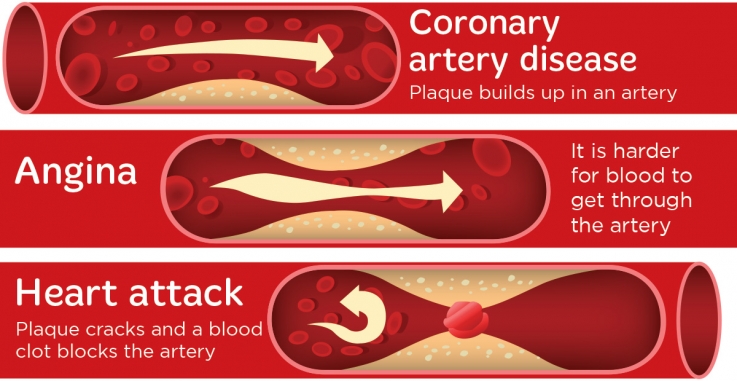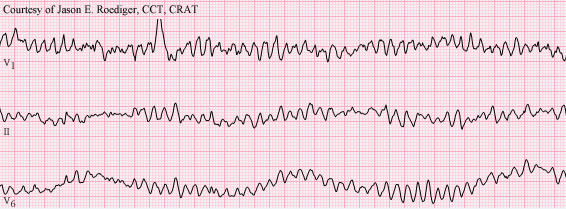- Home
- Heart Problems
Heart Problems
Heart problems are almost always treated in an ICU or coronary care unit. These issues can start in the heart, or can be caused by complications in other organs.
Heart Problem #1 Heart Attack
The most common heart problem continues to be heart attack.
Fortunately only the the really sick patients will need to come to the ICU.
Heart attacks are caused by blockage of one or more blood vessels which normally bring blood and oxygen to the heart itself.
Angina is chest pain caused by decreased blood flow to the heart. The blood vessels in the heart are narrowed by build up of plaques on the b vessel wall. These reduce blood flow to the heart.
The illustration below shows the diseased part of the blood vessel in yellow. As it worsens, all blood flow is cut off, causing the heart damage.

Which Heart Attack Patients Need the ICU?
Patients already hospitalized will be much sicker after a heart attack. They already have some significant problem and it reduces their body's ability to respond to the stress of a heart attack.
These patients are more likely to need the ICU.
Complications such as heart failure, low blood pressure, irregular heart beat and cardiac arrest will require care in the ICU.
Diagnosing a Heart Attack
A heart attack usually begins with chest pain. Specific changes will be seen on the electrocardiogram(EKG)
Next your loved one will be taken to the cardiac cath lab. There dye(also called contrast) is injected to determine which blood vessels are blocked.
A small stent or tube can be threaded up and through the blockage . This re-opens the vessel and restores blood flow to the heart muscle.
If more than one blood vessel is involved, several stents may be needed.
For best results this should all be done within 2 hours after the first signs of the heart attack beginning.
In hospitals without a cath lab, medications may be given intravenously to try and break up the clot.
After a Heart Attack, What Happens in the ICU?
Large heart attacks create many complications that require ICU care. Treatment may include:
Continuous monitoring of blood pressure, heart rate and other organ systems.
Low blood pressure may require continuous medication to maintain a normal pressure. This can last until the heart recovers.
Blood thinners are given to prevent clots forming in and blocking the stent just placed. They will still be necessary after leaving the ICU.
After a heart attack, irregular heartbeats can occur. They can usually be fixed with medication.
Sometimes electrical shock or other devices will be necessary.
Heart Problem #2 Failure
The heart is a muscle. When damaged by a heart attack, poor blood flow or a virus. it does a poor job of pumping sufficient amounts of blood. This is called Heart Failure.
Medications to make heart work better and improve blood pressure will need to be given continuously for several days, or sometimes weeks, until heart function improves.
If the medications alone do not work, mechanical devices may be necessary. These all requires catheters or tubes placed in the larger blood vessels; usually the neck or groin.
They all help the heart more effectively pump blood while it recovers. These include:
- Intra aortic balloon pump
- ECMO or extra corporeal membrane oxygenation
- VAD - Ventricular assist device
- Impella - A tiny pump placed directly into the heart
In heart failure, the poorly pumping heart can cause blood to back up into the lungs. This affects breathing and lowers blood oxygen to dangerous levels.
A ventilator may be required for your loved one. Medications will be given to move the fluid out of the lungs.
It may take several days until breathing and oxygen levels improve. The problem with the fluid is called pulmonary edema.
Then, hopefully, the ventilator and breathing tube can be removed.
Heart Problem # 3 Abnormal Rhythm
Irregular heart beats, such as atrial fibrillation, can worsen blood flow. or lead to death.
Ventricular tachycardia and ventricular fibrillation are life threatening heart beats which require immediate electrical shocks to the heart.
While the heart is being restored to a normal rhythm, chest compression may be necessary.
Multiple drugs will be needed to prevent these kind of heart rhythms from happening again.
Some conditions such as a very low heart rate(bradycardia) will require a cardiac pacemaker. It increases heart rate to normal levels and blood flow improves.
For some ICU patients, it may be temporary with the device being placed on the chest.
For long term use the pacemaker is placed under the skin and wires threaded into the heart for heart rate control.
Heart failure and an enlarged heart increase the risk of a fatal heart rhythm. A combination pacemaker/defibrillator(known as an AICD) is used for these patients and placed the same way.

Above is ventricular fibrillation. Notice the disorganized tracing,

The rapid tracing above is ventricular tachycardia. The rapid rate causes a very low blood pressure.

This last tracing shows a very normal heart rhythm
Heart Problem # 4 Cardiac Arrest
After a massive heart attack, or sudden development of potentially fatal rhythm the heart may simply give out and not be able to pump any blood.
This is a cardiac arrest.
Immediate chest compression is required and the ICU Team or Code Team to the bedside. A breathing tube will be inserted and the patient will need a ventilator.
New intravenous lines are placed so that the emergency drugs can be rapidly given.
There are 2 types of cardiac arrest. The electrocardiogram(ECG) makes the diagnosis.
Ventricular fibrillation can be shocked and emergency drugs given.
The second type, pulseless electrical activity(PEA), shows a rhythm on the electrocardiogram tracing; but the patient has no blood pressure.
This rhythm will not respond to electrical shocks; but only to the emergency medications and chest compression.
Ventricular fibrillation and PEA are life threatening and unfortunately death is a real possibility.
After recovery from cardiac arrest it may be necessary to place your loved one in a coma and cool his or her body temperature down 1 or 2 degrees.
If it works, this can help reduce any brain damage and speed up recovery.
The coma is usually maintained for 1-3 days. Then the patient can be evaluated for any brain damage.
Recovery and Length of ICU Stay
All these issues are serious, major complications. Survivors often have a complicated prolonged course. Temporary setbacks are common.
After leaving the ICU, further hospitalization, including-in- patient rehabilitation will be needed.
Questions to Ask
- Will a stent or surgery be necessary?
- How long will our loved one need to stay in the ICU?
- Is a cardiac arrest or heart stoppage likely to happen?
- Our loved did have a cardiac arrest. How long should it be before he or she wakes up?
- Is permanent brain damage likely?
- Will a heart transplant be necessary?
- If the heart needs extra support like ECMO or a VAD, how long will they be left in place